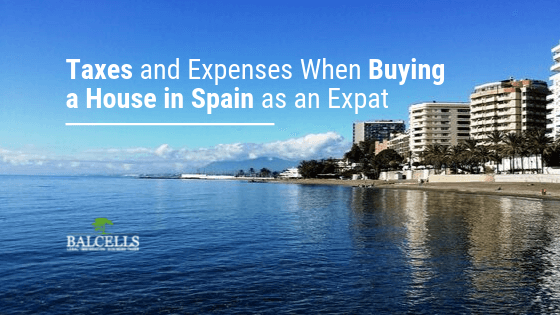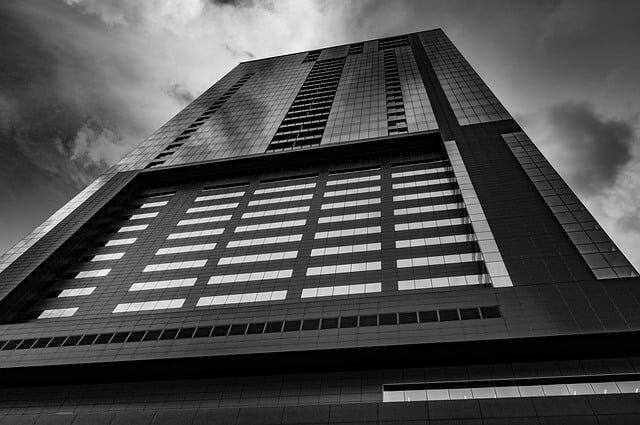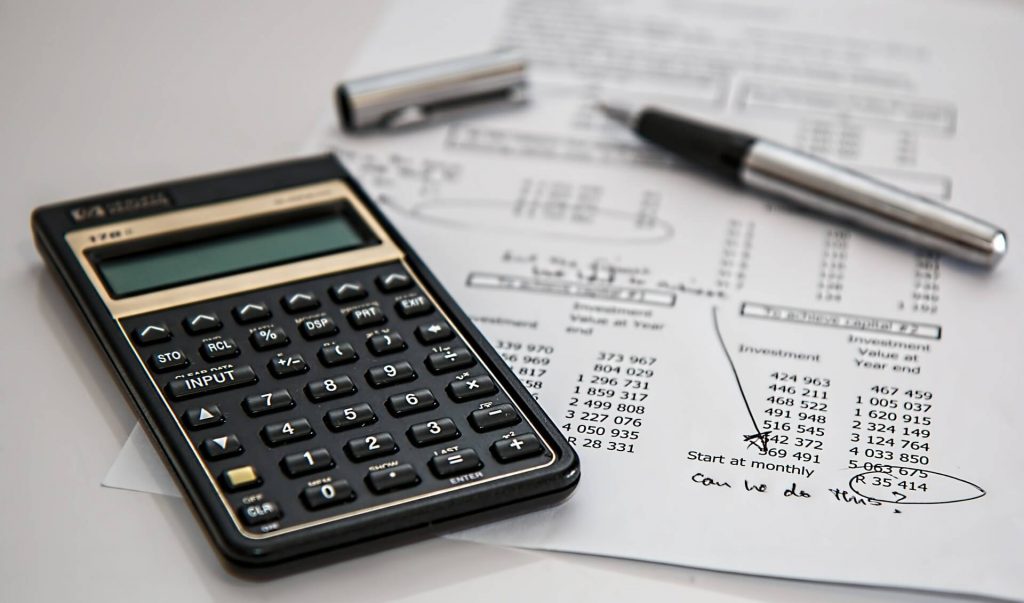One of the first steps when starting your new life in Spain is buying your house. And that is no small thing. It involves an important amount of money. But, how much exactly? Is the agreed price with the seller the total amount you’ll end up paying? (Hint: it is not). In this article we will solve that doubt and exactly detail all the taxes and expenses when buying a house in Spain as an expat/foreigner.
We are going to cover:
But before diving into the exact taxes and expenses to pay, it may be useful to gather a bit of background first. So, in order to fully understand why you need to pay each price and when, knowing the exact real estate process is advisable. Here you can find the step-by-step process of buying a property in Spain.
Property expenses in Spain: an overview
The process is simple. You want to acquire a property in Spain, so you start searching on any of the online platforms out there. Or maybe you rely on an estate agent that helps you out.
No matter the situation, you finally find the house that you like. Perfect location and the size you were looking for. And a charming atmosphere that will really make you feel at home.
And here it comes the real pain: the price.
Nevertheless, the price the estate agent tells you or the price you found online is ok. A bit higher than expected, but still within your range of possibilities.
So you finally have found it. That must be your new home. And you are now thrilled to move forward with the process and make it your residence.
But wait a second. Is that price you found online the real price of the property?
Aren’t you going to end up paying more? And, if the answer is yes, how much more?
Well, if we told you this story is because there is more.
As a rule of thumb, you can expect to spend an extra 10 to 15% on the agreed purchasing price in regards to taxes and extra expenses.
And, as we are not talking about buying a mobile phone, 10% on the price of a property can be a really high outlay of money.
Important note: the exact extra amount will depend on the Autonomous Community in which the house is located. So bear in mind that the final amount can be higher than 15%.
The key when buying to save costs: plan in advanced
Knowing that we will end up paying much more only indicates one thing. It is crucial to plan in advance during the real estate procedure.
On many occasions, reservation contracts are non-refundable. This means that all the money you put in before paying the final amount would be lost if you finally decide not to buy. The real estate agent or the seller will have the total right to get that money from you.
So make sure to fully understand the actual total amount you will end up paying for your chosen house. And compare using that number as a reference (not the one you see online!).
In that sense, it will be really useful to clearly understand the list of taxes and expenses you will be facing as a foreigner.
National citizens and foreigners will pay exactly the same. The same taxes, expenses, and exact rates are applied for both groups. It will be on the sale that differences arise between residents and non-residents.
Let’s dive deep into it.
We need to differentiate between taxes paid for a brand new property and those paid for a re-sell.
Do you have any doubts so far? Ask our lawyers anything or keep reading for more information:
Taxes when buying primary real estate (property/house from a developer)
When purchasing new housing, you will be facing the following taxes:
VAT (Value Added Tax or “IVA”)
The first tax to consider is VAT (called IVA in Spanish).
If we are talking about a completely new house, VAT will be equal to 10% of the price (21% if commercial), and we must differentiate if it is a new-build home or a second-hand one.
By new work we refer to a first delivery house; In other words, a property that is acquired directly from the developer once the construction or rehabilitation has been completed, with its corresponding completion certificate signed by the architect and surveyor in charge of the project. We will find a 10% VAT in this case.
On the other hand, if the home is used continuously for a period of two years or more by someone other than the buyer, it is no longer considered a “first delivery” home or new home, and would be second-hand. Here the percentage would be 21%.
This tax will be paid when signing the deed of sale. Then, the seller will transfer it to the tax authorities (Agencia Tributaria).
Stamp duty or documented legal acts (AJD)
The stamp duty (called “actos jurídicos documentados” in Spanish), is another tax for new properties, and it refers to the registration process.
It completely depends on the region in which the house is located, but it ranges from 0.5% to 2%.
In Barcelona, for example, is 1.5%.
Nevertheless, you can enjoy several tax rate reductions provided that you are inside one of the following two groups:
- You are younger than 35 years old and the house you are acquiring will cost less than 130.000€
- You have any disability and the property costs up to 180.000€
Taxes when buying a second-hand house (re-sale)
But what happens if you are buying the property to the past owner (hence the house has already been sold before)? Then you must consider:
Property transfer tax (ITP)
The property transfer tax is a progressive tax that depends on the price of the property. Again, it varies according to each Autonomous Community in Spain, but as a general rule:
- Up to 8% for a price of 400.000€
- 9% when the price of the property goes from 400.000€ to 700.000€
- 10% from 700.000€ and above
Nevertheless, in some regions like in Valencia, you will face a flat rate of 10%.
We must remember that the Tax Agency can claim a higher payment from the buyer if it considers that the home is worth more than what it has paid for it. Thus, whoever buys a second-hand home and is not well informed, may find herself in the situation that, after paying the farm 7% of what has been spent on the house, it demands the payment of a complementary amount of ITP.
This amount would be 7% of the difference between the value for which the house was registered and the minimum value that the house has in the eyes of the Treasury, plus the corresponding interest for the delay in payment.
For example, if we buy a flat for 250,000 euros, we should pay 17,500 euros for ITP. If in the Tax Agency documents it appears that this house has a minimum price of 300,000 euros and that it has a minimum ITP of 21,000 euros, you will claim the payment of the difference: 3,500 euros plus interest.
Regarding the ITP, in some Autonomous Communities there are allowances for large families. For example, in the Community of Catalonia, the rate to which the ITP is taxed is 5% for large families, as long as it is the habitual residence.
Finally, there is one situation in which you can avoid paying the property transfer tax when purchasing a property. And that happens when both the buyer and the seller are subject to paying VAT. Apart from that, you will need to pay the total amount.
This tax is paid after signing the public deed (the total amount). This is important to know as all the deposits that are paid before the end of the sale won’t include the corresponding prorated ITP percentage. Everything is paid at the end.
Finally, if you are paying property tax you won’t be paying extra stamp duty (AJD). That is because property transfer tax contains the AJD tax within.
Additional expenses when buying a property in the Spanish territory
Now that we have the tax part laid out, let’s move to all the extra expenses you may be facing when acquiring your new house in the Spanish territory. The list that follows is common for each of the two cases we have analyzed before: properties from developers and second-hand houses.
Not all of them may be applicable to your case, but you can use it as a checklist in order to make sure you don’t miss anything:
Notary expenses
Going and using the notary’s services will be required during this legal process.
Why?
Because the notary is required to draw up the public deed. And that, for sure, will have a cost.
The price you will end up paying to the notary depends on many factors, such as:
- The agreed price of the property
- If there is any mortgage
- The number of pages/sections the contract has
- How many parts interfere on the transaction
- The notary itself, as some offer lower rates than others
Nevertheless, we want you to have a clear image. So expect to spend from 300 to 1.000€ there (even though the usual thing would be in the middle).
Registration costs: land registry fees
Once you finally pay for the property, you will need to register it on the Property Register.
The exact amount will depend on the exact region (again), but usually land registry fees are from 0,1% to 2% of the purchasing price that is declared on the deed. Expect to pay 500€ for this.
This also refers to the simple note of registration; which is required to check the status of the property. It will be critical in order to gather relevant data about the property and about the previous owner. Why? Because it is the opportunity to detect if the property has hidden vices.
Essential if you want to avoid future problems (e.g. paying more).
Change of utilities
One of the lasts steps in the process will be transferring the ownership of the utilities (gas, water, electricity, etc.) from the previous owner to you.
Our real estate services for expats include this part (as also the land registry fees) inside the same package, which makes it much more affordable and cheap for you.
Legal Expenses
Because yes, you should have a lawyer next to you throughout the entire process.
Especially if you are a foreigner and your Spanish is not that good, having someone who knows the developer or that can talk and negotiate with the buyer will be really useful.
Besides, you may get lost with all the legal steps and documents to be drafted.
And there is where the figure of the real estate lawyer appears.
The legal expenses associated with them can drastically change depending on the specific firm. They can charge you a fixed price or a percentage that can go from 0.5 to 1.5% of the purchasing price (plus VAT).
Again, we fully recommend you to hire a lawyer for buying a property. They will draft all the contracts, carry out the due diligence, and gather all the required documents for you.
Estate agent
Even though nowadays, with the internet, having a real estate agent is no longer necessary, many individuals rely on them.
Usually, their commission (ranges from 2 to 15% in Spain) is paid by the seller. But you can still take it as a cost for you (buyer) if you agree otherwise.
Mortgage costs and bank charges
It is highly probable that you will use a mortgage or loan to acquire your new house.
And that has several associated expenses worth also considering and adding to the purchasing price.
When you apply for a mortgage, the first step is to pay an appraiser to value the property and the bank knows what percentage of financing it can grant.
In 2021, the valuation involves a cost of between 250 and 600 euros, depending on the entity that carries out the appraisal, the type of property, and its valuation. The appraisal is valid for 6 months from the date of issue.
In general, entities are lending an amount equivalent to 80% of the purchase price or the appraisal value, although some are financing 90-100% of the purchase price, usually looking at the lower one.
Then, the specific mortgage costs (interest rate) that you agree with the bank.
Since the entry into force of the new Mortgage Law in June 2019, the rest of the expenses are assumed by the bank: such as the notary, the registry and the AJD.
The bank that grants us the mortgage is the one that selects an agency to carry out the administrative work and carry out all the procedures.
This expense has been assumed by the entity since June 2019.
It is that the agency must return the remaining money to the mortgaged and deliver the invoices and deeds after paying the notary and registration expenses that his financial entity does not assume.
Transferring money overseas to formalize the payment
This is something that is easily forgotten. But still important: the commission you will pay to transfer the money from your origin country to Spain in order to realize the payment.
Of course, the exact percentage will vary depending on the option/service provider you choose.
NIE number costs
We included this section here; but in fact, this would go at the beginning.
Getting your NIE number is the first step to buy a property in Spain as an expat. It is the basic identification number for foreigners and you need to pay and sign all the related contracts.
Hence, there will be some costs associated with obtaining this number.
Is the property tax in Spain the same for non-residents?
Yes, the property tax (Impuesto sobre Bienes Inmuebles or IBI) in Spain is the same for residents and non-residents. The IBI is a municipal tax applied annually to all property owners, regardless of their residency status.
However, there are differences in other taxes related to property ownership and transactions for non-residents.
Do you need legal assistance?
Just to let you know, if you need some legal help with the whole property purchasing process, we are here for you.
We will manage each step, drafting al the contracts, negotiating with the seller, making sure nothing goes against you.
So if you would like to avoid headaches… Talk to one of our specialized lawyers!
Book a consultation with one of our lawyers and solve all your doubts:

At Balcells Group we have been foreigners effortlessly moving to Spain for over 11 years. We help expats from all around the world with their immigration, business, tax and legal needs; ensuring a legally safe and enjoyable transition to the Spanish territory. Our multilingual team understands the importance of adapting to the cultural and legal specificities of our international clients. We offer a comprehensive service that combines the expertise of several generations of lawyers with the innovation needed to address today’s legal challenges, always striving to simplify processes and ensure reliable, effective results.





